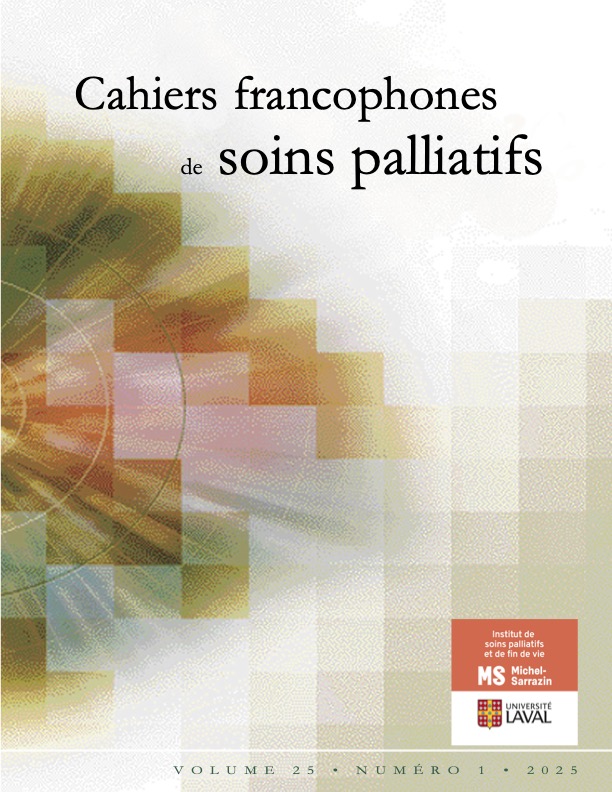Les « champignons magiques » : des alliés en soins palliatifs?
Mots-clés :
Soins palliatifs, Psilocybine, Détresse existentielle, Thérapie psychédélique, Expérience spirituelle, Pratique innovanteRésumé
L’intérêt pour la psilocybine, une substance présente dans les champignons dits « magiques », connaît un regain marqué en psychiatrie et en soins palliatifs. Bien étudiée dans les années 1950 et 1960, elle est tombée dans l’oubli avec l’interdiction des drogues et le déclin de la contre-culture dans les années 1970. Aujourd’hui, son retour soulève des questions sur son potentiel en soins palliatifs, les bénéficiaires possibles et les modalités d’accès pour les patients, suscitant ainsi une réflexion sur les implications de son utilisation dans le contexte contemporain des soins palliatifs.
Références
Agrawal, M., Richards, W., Beaussant, Y., Shnayder, S., Ameli, R., Roddy, K., Stevens, N., Richards, B., Schor, N., Honstein, H. et al. (2024). Psilocybin-assisted group therapy in patients with cancer diagnosed with a major depressive disorder. Cancer. 130(7), 1137-1146. https://doi.org/10.1002/cncr.35010
Barrett, F., Johnson, M., Griffiths, R. (2016). Validation of the revised Mystical Experience Questionnaire in experimental sessions with psilocybin. Journal of Psychopharmacoly. 29(11), 258-269. https://doi.org/10.1177/0269881115609019
Bauereiß, N., Obermaier, S., Özünal, S.E., Harald, B. (2018). Effects of existential interventions on spiritual, psychological, and physical well-being in adult patients with cancer: Systematic review and meta-analysis of randomized controlled trials. Psycho-Oncology. 27(11), 2531-2545. https://doi.org/10.1002/pon.4829
Griffiths, R., Johnson, M., Carducci, M., Umbricht, A., Richards, W., Richards, B., Cosimano, M., Klinedinst, M. (2016) Psilocybin produces substantial and sustained decreases in depression and anxiety in patients with life-threatening cancer: A randomized double-blind trial. Journal of Psychopharmacoly. 30(12), 1181-1197. https://doi.org/10.1177/0269881116675513
Grob, C., Danforth, A., Chopra, G., Hagerty, M., McKay, C., Halberstadt, A., Greer, G. (2011). Pilot study of psilocybin treatment for anxiety in patients with advanced-stage cancer. Archives of General Psychiatry. 68(1), 71-8. https://doi.org/10.1001/archgenpsychiatry.2010.116
Chochinov HM. (2006). Dying, dignity, and new horizons in palliative end-of-life care. CA Cancer Journal for Clinicians. 56(2), 84-103. https://doi.org/10.3322/canjclin.56.2.84
Lewis, B., Garland, E., Byrne, K., Durns, T., Hendrick, J., Beck, A., Thielking, P. (2023). HOPE: A Pilot Study of Psilocybin Enhanced Group Psychotherapy in Patients with Cancer. Journal of Pain Symptom Management. 66(3), 258-269. https://doi.org/10.1016/j.jpainsymman.2023.06.006
MacCallum, C., Lo, L., Pistawka, C., Deol, J. (2022). Therapeutic use of psilocybin: Practical considerations for dosing and administration. Front Psychiatry. 13: 1040217. https://doi.org/10.3389/fpsyt.2022.1040217
Mitchell, A., Chan, M., Bhatti, H., Halton, M., Grassi, L., Johansen C., Meader, N. (2011). Prevalence of depression, anxiety, and adjustment disorder in oncological, haematological, and palliative-care settings: a meta-analysis of 94 interview-based studies. The Lancet Oncology. 12(2), 160-74. https://doi.org/10.1016/S1470-2045(11)70002-X
Parchett-Marble, R., O’Sullivan, S., Tadwalkar, S., Hapke, E. (2022). Psilocybin mushrooms for psychological and existential distress. Canadian Family Physician. 68(11), 823-827. https://doi.org/10.46747/cfp.6811823
Pollan, M. (2018). How to Change Your Mind: What the New Science of Psychedelics Teaches Us About Consciousness, Dying, Addiction, Depression, and Transcendence, Penguin Press, New York.
Ross, S., Agin-Liebes, G., Lo, S., Zeifman, R., Ghazal, L., Benville, J., Corso, S., Real, C., Guss, J., Mennenga, S. et al. (2021). Acute and Sustained Reductions in Loss of Meaning and Suicidal Ideation Following Psilocybin-Assisted Psychotherapy for Psychiatric and Existential Distress in Life-Threatening Cancer. ACS Pharmacology & Translational Science Journal, 18, 4(2), 1165-1180. https://doi.org/10.1021/acsptsci.1c00020
Ross, S., Bossis, A., Guss, J., Agin-Liebes, G., Malone, T., Cohen, B., Menenga, S., Belser, A., Kalliontzi, K., Schmidt, B. et al. (2016). Rapid and sustained symptom reduction following psilocybin treatment for anxiety and depression in patients with life-threatening cancer: a randomized controlled trial. Journal of Psychopharmacoly. 30(12), 1165-1180. https://doi.org/10.1177/0269881116675512
Yaden, D., Nayak, S., Gukasyan, N., Anderson, B., Griffiths, R. (2022). The Potential of Psychedelics for End of Life and Palliative Care. Current Topics in Behavioral Neurosciences. 56: 169-184. https://doi.org/10.1007/7854_2021_278

Téléchargements
Publié
Numéro
Rubrique
Licence
© Dre Angie Shen, Dre Andréanne Côté, Dr Pascal Lamanque, Dr Jean-François Stephan, Dr Houman Farzin 2025

Cette œuvre est sous licence Creative Commons Attribution 4.0 International.